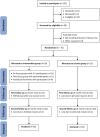Group-based music intervention in Parkinson's disease - findings from a mixed-methods study
- PMID: 32070122
- PMCID: PMC7132435
- DOI: 10.1177/0269215520907669
Group-based music intervention in Parkinson's disease - findings from a mixed-methods study
Abstract
Objective: To evaluate a group-based music intervention in patients with Parkinson's disease.
Design: Parallel group randomized controlled trial with qualitative triangulation.
Setting: Neurorehabilitation in primary care.
Subjects: Forty-six patients with Parkinson's disease were randomized into intervention group (n = 26), which received training with the music-based intervention, and control group (n = 20) without training.
Interventions: The intervention was delivered twice weekly for 12 weeks.
Main measures: Primary outcome was Timed-Up-and-Go subtracting serial 7's (dual-task ability). Secondary outcomes were cognition, balance, concerns about falling, freezing of gait, and quality of life. All outcomes were evaluated at baseline, post-intervention, and three months post-intervention. Focus groups and individual interviews were conducted with the intervention group and with the delivering physiotherapists.
Results: No between-group differences were observed for dual-task ability. Between-group differences were observed for Falls Efficacy Scale (mean difference (MD) = 6.5 points; 95% confidence interval (CI) = 3.0 to 10.0, P = 0.001) and for Parkinson Disease Questionnaire-39 items (MD = 8.3; 95% CI = 2.7 to 13.8, P = 0.005) when compared to the control group post-intervention, but these were not maintained at three months post-intervention. Three themes were derived from the interviews: Expectations versus Results, Perspectives on Treatment Contents, and Key Factors for Success.
Conclusion: Patient-reported outcomes and interviews suggest that the group-based music intervention adds value to mood, alertness, and quality of life in patients with Parkinson's disease. The study does not support the efficacy in producing immediate or lasting gains in dual-tasking, cognition, balance, or freezing of gait.
Keywords: Parkinson’s disease; mixed-methods; music-based intervention; randomized controlled trial; rehabilitation.
Conflict of interest statement
Figures
References
-
- Zhang S, Liu D, Ye D, et al. Can music-based movement therapy improve motor dysfunction in patients with Parkinson’s disease? Systematic review and meta-analysis. Neurol Sci 2017; 38(9): 1629–1636. - PubMed
-
- Kalyani HHN, Sullivan K, Moyle G, et al. Effects of dance on gait, cognition, and dual-tasking in Parkinson’s disease: a systematic review and meta-analysis. J Parkinsons Dis 2019; 9(2): 335–349. - PubMed
-
- Sihvonen AJ, Särkämö T, Leo V, et al. Music-based interventions in neurological rehabilitation. Lancet Neurol 2017; 16(8): 648–660. - PubMed


